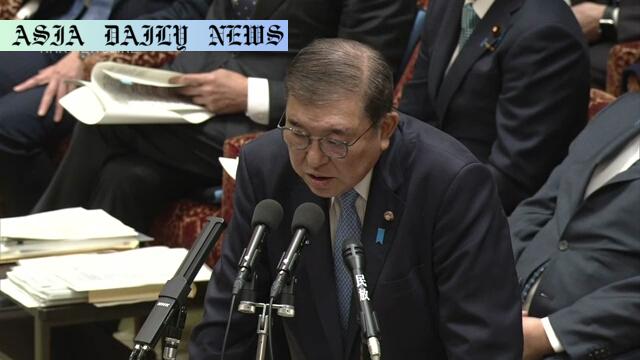rule of law: Japanese PM Ishiba emphasizes that Japan and the US share a common understanding on the importance of the rule of law.
- Japan and the US share a common understanding on upholding the rule of law in global diplomacy.
- Prime Minister Ishiba assures no disagreement with President Trump on the concept of a free and open Indo-Pacific region.
- US tariffs on Canada, Mexico, and China raise concerns over global free trade which Japan plans to explore in further depth.
- Okada emphasized the need for reaffirming rule of law during negotiations to address potential contradictions in US diplomacy.

Introduction: Shared Values on Rule of Law
During discussions in the Japanese Diet, Prime Minister Ishiba Shigeru emphasized that Japan and the United States share a mutual understanding regarding the fundamental importance of the rule of law. This shared principle underpins the concept of a ‘free and open Indo-Pacific,’ ensuring that actions that challenge international norms or alter the status quo through force are deemed unacceptable.
Building Trust in Global Partnerships
Ishiba’s comments highlight Japan’s commitment to fostering a rules-based international order, particularly in the Indo-Pacific region. This commitment aligns with long-standing US foreign policy principles, even amid recent controversies surrounding President Donald Trump’s approach to diplomacy. Ishiba expressed confidence that the upcoming summit would reinforce this alignment without disagreement.
Potential Contradictions in US Diplomacy
Opposition lawmaker Okada Katsuya raised key concerns during the Diet session, noting potential contradictions between the US’s rhetoric on rule of law and its actions, such as bargaining-style diplomacy and tariff implementations. Okada called on Ishiba to ensure that these contradictions are addressed during the summit, so that the concept of rule of law remains at the forefront of bilateral and multilateral negotiations.
Free Trade Under Strain
Another significant point of discussion was the recent US decision to impose higher tariffs on imports from Canada, Mexico, and China. Tariffs of 25 percent and 10 percent, respectively, on goods from these nations have raised global trade tensions. Japan, committed to free trade principles, has pledged to carefully examine the ramifications of these decisions while analyzing how they align with US national interests and the broader impact on global markets.
Importance of Collaboration on the Indo-Pacific Strategy
The Indo-Pacific strategy remains central to Japan’s foreign policy. Ishiba reiterated that Japan’s vision for a free and open Indo-Pacific depends on all actors playing by established rules. By promoting collaboration, Japan seeks to counter attempts to shift regional power dynamics through coercion or force, further strengthening ties with the US in this shared endeavor.
A Broader Perspective on Global Governance
As global challenges escalate, including trade imbalances and diplomatic tensions, a shared understanding of governance becomes even more critical. Leaders like Ishiba recognize that the legitimacy of multilateral institutions and adherence to international law are the cornerstones of sustainable peace and prosperity. This recognition is vital in mitigating economic and geopolitical conflicts that may jeopardize cooperative progress.
Conclusion: Strengthening Ties Through Shared Principles
The upcoming summit between Japan’s Prime Minister Ishiba and US President Trump offers an opportunity to reaffirm shared principles such as the rule of law and free trade. By addressing underlying tensions and working collaboratively on pressing global matters, both nations can solidify their partnership in ensuring a stable and prosperous Indo-Pacific region.



Commentary
Reaffirming the Rule of Law in Global Diplomacy
Prime Minister Ishiba’s emphasis on shared values between Japan and the United States underscores the critical role that alignment in principles plays in maintaining international stability. The rule of law serves as the backbone of fair and just relations between nations, ensuring that no country leverages coercion to achieve its objectives. Ishiba’s confidence in the absence of disagreement with the US on this matter is both reassuring and indicative of the strength of their bilateral partnership.
The Challenges of Tariffs and Bargaining Diplomacy
Okada’s concerns regarding the potential contradictions in US actions and rhetoric highlight a significant challenge in global diplomacy. While the rule of law and free trade are critical to global stability, the implementation of unprecedented tariffs undermines these very principles. Japan’s commitment to analyzing the impact of these tariffs demonstrates its proactive approach to navigating such complexities, emphasizing measured responses rather than hasty judgments.
Shared Responsibility for a Free and Open Indo-Pacific
The concept of a free and open Indo-Pacific has become a focal point for Japan and other regional players. However, ensuring that these ideals are upheld requires consistent effort and collaboration. Ishiba’s reiteration of this principle reflects Japan’s dedication to countering actions that seek to destabilize or alter the status quo through coercive means. As global challenges evolve, it is crucial for nations to consistently reaffirm their shared values to address shifts in power dynamics effectively.
Overall, the upcoming summit provides a critical moment for Japan and the US to align their strategic priorities and reaffirm their commitment to the principles that have long guided their partnership. Such dialogue is essential to ensuring that the challenges of today are met with cooperation and resolve.